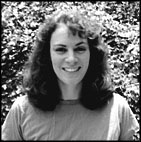Herzog Navigates Hectic Waters of Congressional Life on the Hill
 Antonia Herzog |
Nothing brought the reality of the world of the U.S. Congress into sharp focus for APS Congressional Fellow Antonia Herzog as much as the day she was asked to draft a rationale for an upcoming vote on the Senate floor a mere 15 minutes before the voting was scheduled to take place - concerning a proposed amendment she knew nothing about. "It's so important for members of Congress to make every floor vote," she says of what she learned from the experience. "Their schedules are basically ruled by when votes are going to occur, which is rarely certain until the last minute."
Fortunately, not every day of her fellowship year featured such last-minute scrambling, although she admits, "Things do operate constantly in crisis mode." Herzog spent the last year as a special legislative assistant in the Congressional office of Senator John D Rockefeller IV (D-WV), juggling such varied duties as preparing for hearings, organizing meetings, writing statements to be read from the floor, building support for pending legislation, and meeting with constituents and lobbyists. "It's not that you actually figure out how Congress works in a single year, but you do walk away with a much better understanding of how our country runs, and how to have an impact on the process," she says. "And that type of knowledge is useful no matter what you end up doing."
Herzog chose to work in Rockefeller's office in part because of his longstanding interest in science and technology issues. At the time, he was the ranking Democrat on the Commerce Committee's Science, Technology & Space Subcommittee, and he is currently the ranking member of the Aviation Subcommittee. But she also admired his idealistic decision to move to West Virginia some 30 years ago, despite his privileged background, with hopes of assisting the population of this predominantly poor region. In particular, she worked on legislation involving authorized funding increases for R&D, and to streamline the technology transfer process from government labs to the private sector, although none of her projects were voted into law. "My year was about small victories, moving things forward and raising people's awareness about issues I felt were important," she says, citing R&D funding and alternative fuel vehicles as examples.
The latter is a natural extension of Herzog's long-standing interest in energy use and its impact on the environment, evidenced by her past involvement in the San Diego chapter of the Sierra Club to preserve the remaining coastal wetlands in San Diego County. As a member of Rockefeller's staff, she was able to help build co-sponsorship of a bill to promote tax incentives to promote the use of alternative fuel vehicles, and to work the legislation into the massive tax bill presented to the Senate Finance Committee. The bill was eventually vetoed by President Clinton, in large part because of the Republicans' proposed tax cut of $795 billion, but "It was neat to be involved in something that was featured on the front pages of the Washington Post and New York Times every day, even in a relatively minor capacity," she says.
Herzog came to the APS fellowship from the American Association for the Advancement of Science (AAAS), where she served as a consultant. The experience introduced her to the various issues related to the ethical, legal and policy implications of science and technology, and convinced her that she wanted to make science policy her career. She earned her PhD in physics from the University of California, San Diego. There she studied the transport properties of disordered metallic and superconducting one-dimensional wires. She also gained valuable industrial experience through a summer internship at Xerox Corporation, and held a postdoctoral research position at the Salk Institute for Biological Studies, investigating the organization of neuronal circuits for visual information processing.
Ironically, Herzog didn't use her specific knowledge of physics during her fellowship year on the Hill, but she still considers science fellows a necessary asset to Congress. "What proved crucial was having an understanding and appreciation of the scientific process and enterprise, which few of the many lawyers on the Hill possess," she says. For her part, she appreciated the network of former fellows currently working throughout government, academia and the private sector, and while her future plans are not yet final, she ultimately hopes to remain in science policy, possibly working for a non-profit science policy organization. "I firmly believe that no matter where my career may lead, this year will continue to have a profound impact on it," she concludes.
©1995 - 2024, AMERICAN PHYSICAL SOCIETY
APS encourages the redistribution of the materials included in this newspaper provided that attribution to the source is noted and the materials are not truncated or changed.
Editor: Barrett H. Ripin
Associate Editor: Jennifer Ouellette
December 1999 (Volume 8, Number 11)
Articles in this Issue

